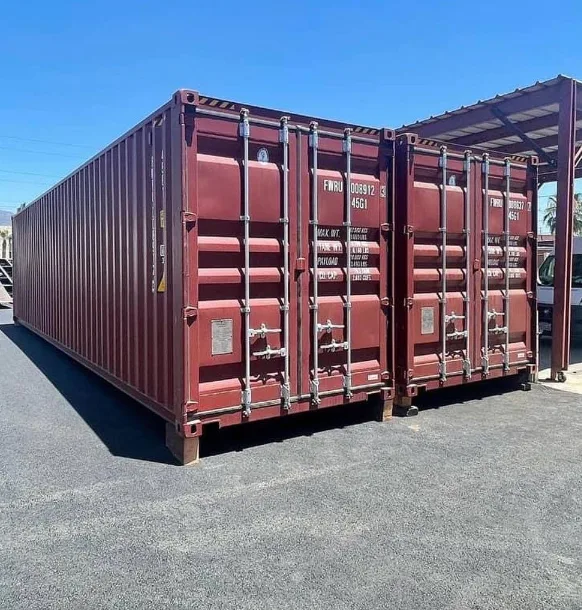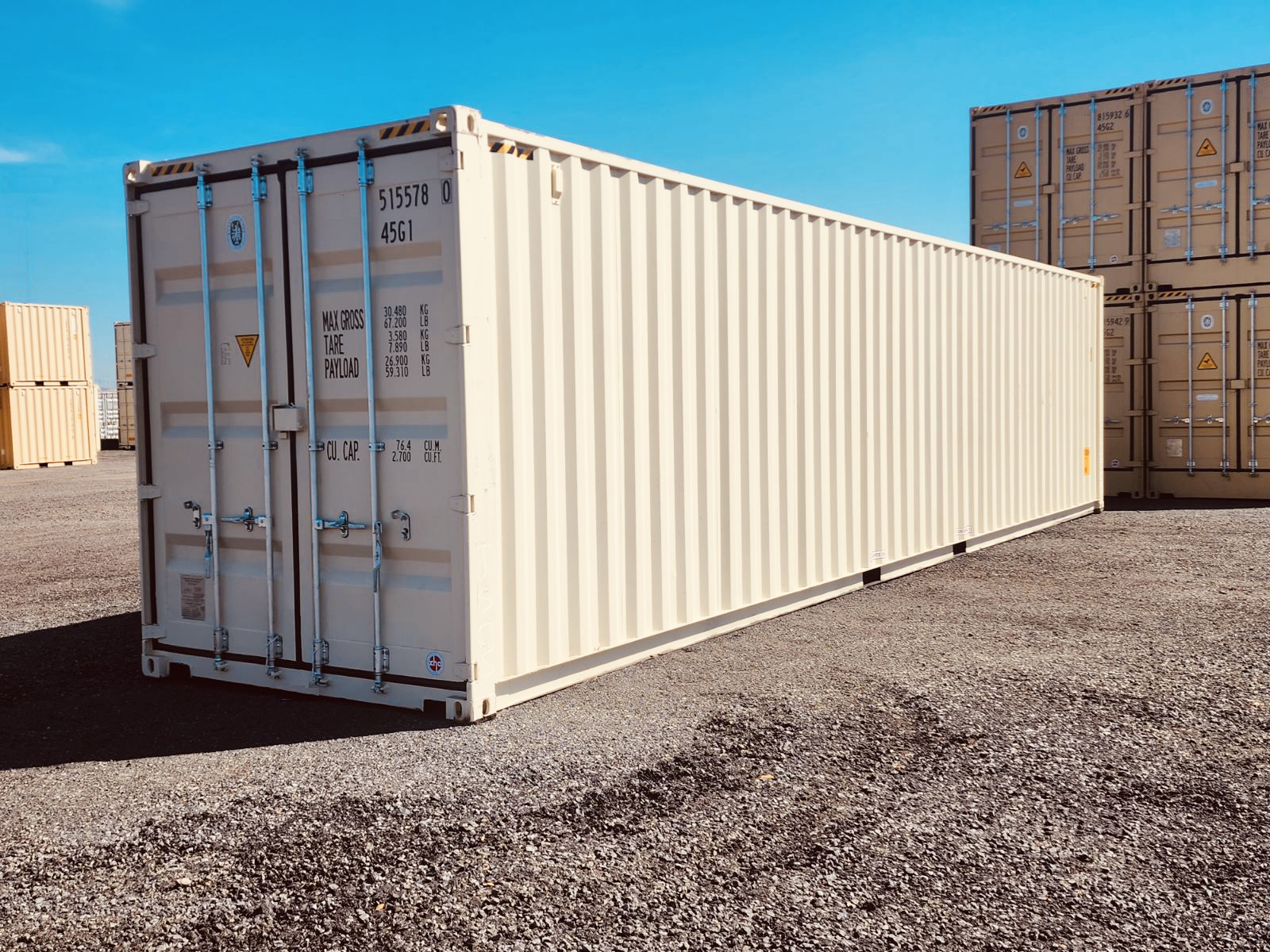Smart Entrepreneurs Are Choosing to Lease New Shipping Container 40 x 8 x 9.6—Here’s Why
Smart Entrepreneurs Are Choosing to Lease New Shipping Container 40 x 8 x 9.6—Here’s Why
Blog Article
The Ultimate Guide to Picking the Right Shipping Container for Your Needs
When it concerns picking the ideal shipping container, comprehending your specific requirements is essential. You'll want to consider elements like dimension, kind, and material to assure you make the most effective option. From typical sizes to specialized choices, there's a great deal to check out. And also, budgeting for both the container and any type of modifications can make a huge difference. Let's break down the essential facets to assist you find the perfect fit for your demands.
Understanding Shipping Container Sizes
When you're picking a shipping container, recognizing the numerous sizes offered is vital for making the ideal choice. Shipping containers commonly come in typical lengths of 20 and 40 feet, yet you'll also find various other measurements. Knowing the dimension you need depends on what you plan to store or transport.If you're moving smaller things, a 20-foot container may be excellent, while bigger deliveries frequently call for a 40-foot container. The elevation can likewise differ; high cube containers use extra upright room, which can be valuable for taller goods.Before determining, determine your freight, and take into consideration exactly how much room you'll require for packing and discharging. Always factor in potential future needs-- going with a slightly larger container may conserve you inconvenience down the line. Inevitably, picking the ideal dimension will enhance performance and assure your products are protected throughout transit
Kinds of Shipping Containers Available
There are several kinds of shipping containers available, each developed for details objectives and freight needs. The typical dry container is functional, ideal for general cargo. If you're delivering subject to spoiling products, consider a chilled container, which maintains a regulated temperature level. For oversized products, high cube containers offer additional elevation, fitting taller loads.If you need to carry hefty machinery or devices, level shelf containers supply a strong base without walls. Meanwhile, open-top containers permit easy loading of high cargo, with a detachable tarpaulin covering for security. If you're seeking adaptability, consider a collapsible container that can be conveniently kept when not in use.Lastly, specialized containers like storage tank containers are used for fluids, while vented containers are developed for bulk cargo that requires ventilation. Knowing your freight kind will aid you choose the best container to satisfy your delivery requires efficiently.
Material Considerations for Toughness
When picking a delivery container, the material plays an essential duty in its durability. You'll want to weigh the benefits of steel versus aluminum, particularly relating to deterioration resistance. Understanding these factors can help you make a more informed selection for your shipping needs.
Steel vs. Aluminum Containers
How do you pick between steel and light weight aluminum containers for your delivery requires? Start by taking into consideration longevity. Steel containers are durable and offer superb strength, making them perfect for heavy tons and rough problems. They stand up to damages from effects and are usually more economical, which can be a significant aspect for budget-conscious buyers.On the other hand, light weight aluminum containers are lightweight, which can conserve you on delivery prices. They're much easier to navigate and are a great choice if you need to carry products frequently. Nonetheless, aluminum is typically much more expensive and less durable than steel. Evaluate your certain requirements meticulously, including weight, price, and the type of freight you'll be shipping, to make the ideal option for your circumstance.
Deterioration Resistance Elements
Picking the best product does not just entail weight and expense; corrosion resistance plays a considerable role in toughness. When selecting a delivery container, think about the atmosphere it'll encounter. Steel containers, while strong, can corrosion if not correctly treated. Search for options with safety finishings or galvanization to enhance their lifespan. Aluminum, on the various other hand, supplies natural rust resistance, making it excellent for seaside areas or damp problems. However, it can be a lot more pricey. Furthermore, analyze the container's usage-- if it'll be subjected to chemicals or severe weather, prioritize products that can stand up to these conditions. Spending in a corrosion-resistant container currently can save you from expensive repairs or substitutes down the line. Choose carefully for long-term benefits.
Alterations and Modification Options
Delivering containers aren't simply for delivering products; they can be changed to meet your certain requirements via various alterations and customization choices. You can convert a typical container into a cozy office area, a momentary retail shop, or perhaps a personal health club. The possibilities are nearly endless.Think concerning adding windows, insulation, or ventilation to improve convenience. You may also take into consideration electrical circuitry, pipes, or perhaps personalized shelving to boost functionality. If protection's a problem, strengthened locks can supply tranquility of mind.For visual charm, you can paint the container or add an one-of-a-kind style to make it stand out. Do not forget floor covering alternatives-- whether you desire sturdy plywood or something much more advanced, it can raise the space.Ultimately, tailoring your delivery container to suit your requirements can enhance use and produce an unique atmosphere that mirrors your design.
Examining Your Transport Requirements
When it involves utilizing your customized delivery container, understanding your transportation needs is essential. Begin by determining what you'll be delivery-- whether it's hefty tools, retail items, or personal products. Each kind of freight has different needs concerning size, weight, and accessibility.Next, consider the range and mode of transport. Are you delivering locally, country wide, or worldwide? This affects the container's layout and performance. If you're using vehicles, ensure your container fits common measurements for very easy loading and unloading.Additionally, consider transportation problems. Will your items require unique security from weather condition or temperature fluctuations? If so, you might need insulation or ventilation attributes in your container.Lastly, examine exactly how often you'll be transporting products. Regular deliveries may require a more long lasting and flexible container to fulfill continuous needs. By dealing with these elements, you'll be well-prepared to pick the best shipping container for your needs.
Budgeting for Your Delivery Container
Establishing a budget plan for your shipping container is vital for ensuring a smooth buying process. Establish just how much you can pay for to invest. Costs can vary substantially based on dimension, problem, and Recommended Site type. New containers normally set you back a lot more, yet used ones can supply considerable savings.Next, take into consideration any type of added expenses you may sustain, such as transport fees, distribution fees, and adjustments. If you prepare to personalize the container, factor in those expenditures also. Research study various suppliers to compare prices and locate the best deal that meets your needs.Don' t neglect to include any licenses or regulations that may use to your purchase and usage of the container. By clearly outlining your budget, you'll be better prepared to make enlightened choices, guaranteeing you get the ideal container without breaking the financial institution.
Maintenance and Treatment for Long life
To assure your shipping container lasts for many years, regular upkeep is key. Begin by inspecting the outside for rust, damages, and damages. If you spot any kind of issues, resolve them instantly to protect against additional degeneration. Clean the container periodically, both within and out, to get rid of dirt, particles, and moisture that can lead to corrosion.Ensure the doors seal properly and oil the joints to avoid rust and sticking. If you're making use of the container for storage, take into consideration adding ventilation to lower moisture and mold and mildew growth. For extra security, apply a rust-inhibiting paint or sealer annually.If your container's located in a harsh environment, like coastal locations, you might require to increase maintenance regularity. Keep an eye on the flooring, also; any type of signs of wear ought to be repaired right now. With these straightforward actions, you'll expand the life of your shipping container considerably.
Frequently Asked Inquiries
Exactly how Do I Find a Reliable Delivery Container Provider?
To find a trusted delivery container supplier, beginning by researching on-line testimonials, requesting suggestions from buddies or market contacts, and comparing prices. Always inspect their credentials and warranty they offer top quality containers that meet your demands.

Can I Rental Fee a Shipping Container Rather Than Buying?
Yes, you can certainly rent out a delivery important site container as opposed to acquiring one. Lots of providers offer rental alternatives, which can save you cash and supply flexibility if you only require it for a short duration.
What Permits Are Needed for Container Positioning?

Are Shipping Containers Weatherproof and Appropriate for Outdoor Storage Space?
Yes, shipping containers are generally weatherproof, developed to stand up to extreme problems. Their durable building and construction maintains your items secure and dry, making them ideal for exterior storage space. Simply ensure proper air flow to avoid moisture build-up inside.
Exactly how Do I Move a Delivery Container As Soon As Purchased?

Report this page